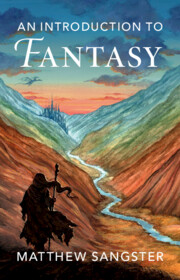Book contents
- An Introduction to Fantasy
- An Introduction to Fantasy
- Copyright page
- Contents
- Figures
- Introduction
- 1 Fantasy, Language and the Shaping of Culture
- 2 The Value of Iteration
- 3 Root Formations
- 4 Enlightenment and its Shadows
- 5 Fashioning Worlds
- 6 Fantastic Communities and Common Ground
- Envoi
- Acknowledgements
- Select Bibliography
- Index
2 - The Value of Iteration
Published online by Cambridge University Press: 07 October 2023
- An Introduction to Fantasy
- An Introduction to Fantasy
- Copyright page
- Contents
- Figures
- Introduction
- 1 Fantasy, Language and the Shaping of Culture
- 2 The Value of Iteration
- 3 Root Formations
- 4 Enlightenment and its Shadows
- 5 Fashioning Worlds
- 6 Fantastic Communities and Common Ground
- Envoi
- Acknowledgements
- Select Bibliography
- Index
Summary
One of the most common criticisms of Fantasy is that it is repetitive, derivative and uninspired. This chapter argues that this is a misconception. Rather than repeating, Fantasy iterates: its creators self-consciously rework tropes and patterns in manners that acknowledge the necessarily entangled nature of human communications and cultures. Drawing on work by Colin Burrow on imitation and Linda Hutcheon on adaptation, it argues that originality is recent, problematic and overrated as a criterion for judging art, and that fantasies demonstrate a productive awareness of culture as being collaborative and renegotiable. The main subjects discussed include Diana Wynne Jones’s The Tough Guide to Fantasyland and The Dark Lord of Derkholm; Thomas Malory’s Launcelot and T. H. White’s Lancelot; Death in Neil Gaiman’s The Sandman; dragons many and various; Terry Brooks’ much-maligned The Sword of Shannara; fan fiction and N.K. Jemisin’s Inheritance series; and the marriage of lore and mechanics in Magic: The Gathering. The chapter closes by considering the archetype-focused criticism of Vladimir Propp and Joseph Campbell, discussing both the attractions of such models and how imposing grand patterns can blind us to both stories’ irreducible specifics and their exclusions.
Keywords
- Type
- Chapter
- Information
- An Introduction to Fantasy , pp. 97 - 161Publisher: Cambridge University PressPrint publication year: 2023

